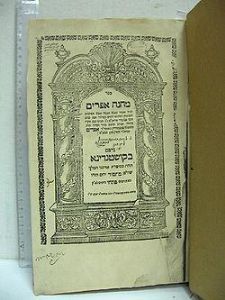A Short Tribute
Hacham Ephraim Navon, son of Hacham Aaron, was born in 1677 in Kushtandina, today's Istanbul, Turkey.
In 1700 he immigrated to the Land of Israel with his father-in-law, Lord Yehuda Irgaz, and settled in Jerusalem, where he was greeted with great joy and recognition, as his eruditeness in Torah merited. During his stay in the Holy City, he isolated himself for over ten years, poring over the Talmud, Maimonides, and the Beit Yoseph in the Neve Shalom yeshiva founded by Hacham Isaac Di Mayo.
Jerusalem's population waned as the Ottoman Pascha's harassment increased. Numerous taxes and fines were imposed on the Jews, and the level of harassment kept rising until Hacham Ephraim Navon was practically the last member of the community's leadership left. After a period, the situation having become unbearable, he left on a saintly mission and returned to Kushta to raise support for Jerusalem's kollel study houses.
The sages of Kushta convinced him to remain in the city and he was appointed Dayan and halakhic adjudicator by Hacham Yehuda Rosanes, author of HaMishna LaMelech. While in Kushta, he wrote his famous work, Machaneh Ephraim, which includes Responsa, and original commentary and interpretations.
Hacham Ephraim Navon passed away on 26 Iyar, 5495 (1735) and was buried in Kushta. On his deathbed, he asked his son, Hacham Yehuda Navon, author of Kiryat Melech Rav, to edit and prepare his book for publication. His book as published three years after his death.
A few quotes from the Rabbi on 'Customs of Israel' Machaneh Ephraim, Halakhot on Vows, Section 40, p. 77, Or Haim – New Press, The Center for Jewish Books, Jerusalem 2011
Reuben dedicated his property [for the public fund], and his widow now claims [the sum of] her ketuba [marriage contract]. This means that it is to be paid from the monies that her late husband designated for the hekdesh, since he had no other property. We seek that you instruct us, whether the law is on her side - since it is clearly stated in her ketuba that he issued a lien to her for land and additional property - or whether she does not have the authority to withdraw funds from the hekdesh…
The words of the scribes are rigorous and good, as those who have the authority to expropriate monies. Even if their rulings may be contested, it is usually appropriate to not to seize [funds] from their possession. Townspeople's amendments, however, are made according to the ways of merchants, through negotiation and as each generation sees fit, just as in our case, where they refrain from consuming designated properties, so as to maintain order and so that individuals not incur losses and the like, certainly no individual has the authority to annul a ruling [Din Torah] by contesting its amendment, the principal of law being is but general custom…According to the sum of reasons and explanations I have here written, it seems that the widow should be granted the power of attorney that the amount of her ketuba be paid out from the monies her late husband designated to the Hekdesh.
Machaneh Ephraim, Halakhot on Claiming Debts, Section 1, p. 535 – 540, Or Haim – New Press, The Center for Jewish Books, Jerusalem 2011
A few quotes from the Rabbi on 'Customs of Israel' in which he allows eating meat in an obligatory festive meal [se'udat mitzvah] despite the custom to refrain from eating meat from the 17th of Tammuz
The custom to refrain from eating meat from the 17th of Tammuz is the equivalent of a vow. However, if one has the opportunity to participate in an obligatory festive meal they are permitted to eat meat, for it is not actually a vow but is considered as having accepted to undertake a fast. It is like saying "I will fulfill this commandment" when it is obligatory by law. Any case of a mitzvah is permitted, since a vow to fulfill a mitzvah is not applied at the expense of another mitzvah.
Machaneh Ephraim, Halakhot on Vows, Section 40, p. 77, Or Haim – New Press, The Center for Jewish Books, Jerusalem 2011
